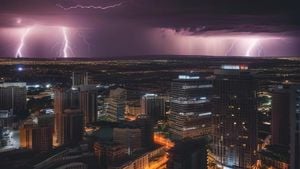The COP29 climate talks commenced on November 12, 2024, in Baku, Azerbaijan, drawing attention for various reasons — not least of which is the conspicuous absence of major world leaders. This year's conference has been likened to the International Chess Federation's world championship, focused heavily on strategy rather than star power. Notably, the leaders of the world's biggest polluters, including the U.S., China, India, and Indonesia, chose to sit it out, leaving many to question the sincerity and urgency behind climate action.
"The people who are responsible for this are absent," remarked Belarusian President Aleksandr Lukashenko, highlighting the deserters' neglect of responsibility. The absence of heads of state from these nations, which constitute over 42% of the global population and are responsible for more than 70% of emissions, casts long shadows over the conference's credibility. Climate scientist Bill Hare pointedly noted, "It’s symptomatic of the lack of political will to act. There’s no sense of urgency."
Yet, amid the heavyweight no-shows, figures such as U.K. Prime Minister Keir Starmer managed to steal some of the spotlight. Starmer unveiled aggressive U.K. climate targets, pledging to reduce carbon emissions by 81% from 1990 levels by 2035. This ambitious goal aligns with the Paris Agreement's aim to keep global warming below 1.5 degrees Celsius. Experts hailed his commitment as “a strong signal to the international community,” emphasizing the importance of setting high-ambition targets at this defining moment.
While Starmer's ambitions were welcomed, critics pointed out the need for immediate and actionable steps. Campaigners from the Green New Deal Rising insisted, "Serious action is needed to turn these words from COP29 commitments to real, effective climate change management." They’re calling for plans and investments to decarbonize various sectors, emphasizing community engagement and job creation as key facets of these efforts.
On the sidelines of the talks, United Nations Secretary-General António Guterres didn't hold back from addressing the urgent need for climate finance. Emphasizing the inadequacy of the current $700 million capitalization of the Loss and Damage Fund, Guterres juxtaposed it against the staggering costs incurred by climate disasters, which he asserted would make funding levels fall drastically short for many developing nations. "Climate disasters are piling up – harming those who’ve done the least, the most," he urged.
Guterres outlined specific measures to tackle the funding gap, advocating for innovative funding mechanisms like levies on the aviation and shipping industries and enhanced lending capacities for multilateral development banks. He underscored the necessity of delivering on fiscal commitments to address climate change comprehensively, likening the $100 billion annual target set during previous COP meetings to mere aspirations.
Apart from addressing the absence of major player leaders and the pressing funding challenge, the conference has also ignited conversations surrounding the transition from fossil fuels. Azerbaijan's President Ilham Aliyev defended his country's oil and gas dependency during his address, calling these resources "gifts from God" and asserting the need for countries rich in resources to leverage them appropriately. This stance ruffled feathers among climate activists. Rev. Fletcher Harper of GreenFaith critiqued his statements, declaring fossil fuels to be "literally the highway to hell for billions of people and the planet." At his opening speech, Aliyev also declared his commitment to transitioning toward greener energy but with realistic expectations — an approach critics described as somewhat lukewarm.
Nevertheless, with numerous leaders from smaller nations present, including many from climate-vulnerable countries, the conversations at COP29 remain tangentially hopeful. Leaders from small island nations and African countries used their platform to articulate the urgent situations they face due to climate change, urging for tangible support from developed countries. Marshall Islands President Hilda Heine reminded the assembly, "Time will judge those who fail to make the transition," pushing for immediate action.
Meanwhile, the media spotlight has inevitably fallen on the contrasting policies likely to emerge from varying leadership styles, particularly concerning the new leadership under U.S. President Donald Trump. Trump has signaled his intent to revamp environmental regulations, casting doubts over the U.S. commitment to international climate agreements. Observers couldn't ignore the bizarre juxtaposition between Starmer's forward-leaning ambitions and Trump's conceivable backpedaling, raising questions about transatlantic alliances on climate initiatives.
Experts, aware of the widening financial gap and the increasing frequency of extreme weather events exacerbated by climate change, emphasized the summit's importance for creating actionable policies to guide future interactions. The conference, designated as the finance COP, aims to establish more stringent climate finance goals to replace the previous $100 billion annual target—one many experts believe was hardly met.
Guterres reiterated, "Developing countries must not leave Baku empty-handed," highlighting the need for collaborative international efforts, accountable funding, and ambitious actions outlined with concrete plans behind them. He noted how shifting weather patterns are already crippling economies, underscoring the urgency of meeting the climate finance challenges presented at COP29.
Although the backdrop of COP29 is fraught with challenges — from significant absent leaders to insufficient climate funding — the spirit of urgency and the counter-narratives being articulated by those who are present highlight the persistent demand for sustained dialogue and action on climate change. The U.K.'s goal and the voices of smaller nations continue to resonate against the backdrop of climate crises relentlessly facing vulnerable communities, marking yet another chapter of hopeful disappointment at the world's climate leadership stage.
With COP29 set to continue until November 22, the deliberations will either carve out new paths for climate action or risk deepening the pessimism about future global commitments.



